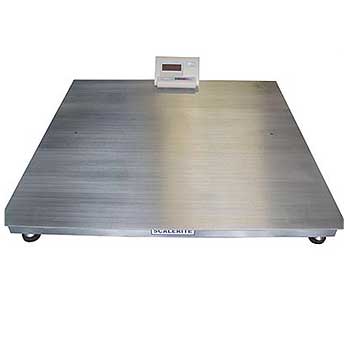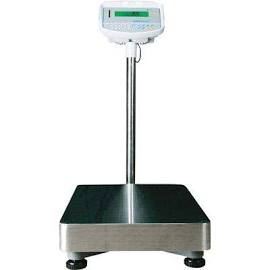Top Industries That Benefit from Using Industrial Scales for Operations
Top Industries That Benefit from Using Industrial Scales for Operations
Blog Article
Just How Commercial Scales Job: An Extensive Overview for New Users
Recognizing the technicians behind commercial scales is essential for brand-new customers who intend to make certain accuracy in their dimensions. These tools count on load cells and strain scale modern technology to transform weight right into a quantifiable style, yet the nuances of their procedure prolong past plain capability. From the different types readily available to the vital techniques for appropriate usage and maintenance, each aspect plays a substantial role in accomplishing trusted outcomes. As we check out these elements, one need to consider just how these elements communicate to boost efficiency in varied industrial applications.
Essentials of Industrial Scales
Industrial scales are essential devices used throughout numerous markets, including manufacturing, logistics, and agriculture, to ensure precise weight measurements of hefty loads. The essential concept behind commercial scales includes the conversion of weight into a quantifiable kind that can be displayed digitally or analogically. These ranges use various devices, such as lots cells or mechanical bars, to identify the weight of items placed upon them.

Along with their dimension abilities, commercial ranges are developed to withstand extreme environments, including robust building and construction that stands up to dirt, moisture, and hefty effects. Calibration and upkeep are vital to guarantee precision, as also small discrepancies can lead to significant economic implications. By recognizing the essentials of commercial ranges, customers can value their relevance in numerous industrial applications.
Kinds Of Industrial Scales
Various sorts of commercial ranges provide to the varied demands of different markets, each designed to take care of details weighing jobs with precision and dependability. Amongst one of the most typical types are floor ranges, which are optimal for evaluating bulky and heavy things. These scales usually include big platforms and can accommodate palletized goods, making them important in storage facilities and delivery centers.
Another kind is bench ranges, which are usually utilized for smaller sized products in production and retail settings. They supply exact dimensions for products that need accuracy, such as chemicals or components in production line (Industrial Scales). For mobile operations, mobile scales supply adaptability and convenience of transport, suitable for fieldwork or temporary installations
In applications calling for high-capacity measurements, such as wholesale product handling, crane scales and load cells are utilized. These ranges can gauge tons suspended from a crane or other training device, guaranteeing safety and security and precision during procedures. In addition, specialized scales like checkweighers are utilized in manufacturing lines to maintain quality control by making certain that items satisfy weight specs. Each kind of commercial scale plays an important role in improving operational efficiency and accuracy across numerous sectors.
How Evaluating Systems Work
Weighing mechanisms are crucial parts that enable accurate measurement of mass throughout various commercial scales. These devices use various concepts of physics and engineering to offer accurate weight readings, necessary for stock management, quality control, and compliance with regulative requirements.
One usual Discover More sort of evaluating system is the lots cell, which runs on the concept of pressure assesses. When a load is applied, the tons cell warps somewhat, creating an electrical signal proportional to the weight. This signal is then exchanged an understandable weight measurement by the scale's electronic devices.
One more extensively utilized mechanism is the mechanical equilibrium, which uses a system of bars and weights. Industrial Scales. This technique relies upon the principle of equilibrium, where the weight of the object being measured is stabilized against understood weights, permitting for direct measurement
Furthermore, hydraulic and pneumatically-driven ranges leverage liquid characteristics principles to gauge weight. These systems make use of the stress applied by a load to determine weight, using high precision for enormous loads.
Correct Usage Methods
When utilizing industrial scales, adhering to proper use techniques is essential for preserving and ensuring exact dimensions tools stability. It is crucial to select the appropriate range for your certain application, as scales vary in capacity and accuracy.
Prior to evaluating, guarantee that the scale is positioned on a secure, level surface cost-free from disturbances or vibrations. This will certainly assist to lessen errors triggered by external factors. In addition, adjust the range according to the supplier's specifications before utilize, making sure that it is operating correctly.
When positioning products on the scale, distribute the weight equally to stay clear of tipping or harming the equipment. Constantly permit the range to stabilize prior to videotaping the weight, as fluctuations might happen during initial placement. For bulk materials, use containers that are appropriate for the range size to avoid overloading.
Additionally, prevent positioning overly warm go to website or cool things straight on the range, as temperature level variants can affect precision. Keep the evaluating system tidy and cost-free of particles to protect against contamination and make certain reliable results. By complying with these strategies, users Visit This Link can optimize the performance and durability of their commercial scales.
Upkeep and Calibration Tips
Making certain the durability and accuracy of industrial ranges requires diligent upkeep and regular calibration. A preventive maintenance routine is essential; it should include routine inspections to recognize damage, specifically on tons cells and other delicate elements. Regularly cleansing the scale's surface area and ensuring the surrounding area is complimentary from particles will aid keep its integrity and efficiency.
Calibration is similarly essential and must be performed at normal periods or whenever the scale experiences substantial modifications in temperature level, moisture, or physical displacement. Utilize licensed calibration weights that are traceable to national criteria for precision. Document each calibration session meticulously to track performance in time and identify any kind of patterns or persisting concerns.
In addition, bear in mind the scale's setting. Stay clear of placing it near resources of resonance, electromagnetic interference, or severe temperatures, as these variables can detrimentally impact dimensions. Train all drivers on correct scale use and maintenance protocols to make sure constant performance and precision. By adhering to these maintenance and calibration suggestions, individuals can boost the dependability of their commercial scales, ensuring ideal operation in any setting.
Verdict

Understanding the auto mechanics behind industrial scales is critical for new customers that desire to make certain precision in their measurements.Industrial ranges are crucial devices used across different fields, including production, logistics, and agriculture, to make certain accurate weight measurements of hefty lots. The fundamental concept behind commercial scales involves the conversion of weight right into a quantifiable form that can be displayed digitally or analogically. By comprehending the fundamentals of industrial scales, individuals can appreciate their importance in different industrial applications.
In final thought, comprehending the operation and upkeep of industrial scales is critical for guaranteeing precise weight measurements in different applications. (Industrial Scales)
Report this page